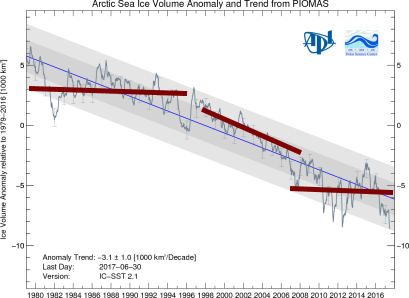-
Posts
7,874 -
Joined
-
Last visited
Content Type
Profiles
Blogs
Forums
American Weather
Media Demo
Store
Gallery
Everything posted by WidreMann
-
Temperatures are now averaging above normal 80 north and neither the GFS nor Euro look great for continued cold temps. At least we don't have big storms messing things up. That's the saving grace. I bet we'll see a drop in the next two weeks, but it seems majorly unlikely to beat 2012, or even last year, I think.
-
That's where I used to go all the time, I just didn't know that was the acronym you were using. I do miss it as well. Much more detail and good anomaly charts as well.
-
What's the CT data?
-
I would trust the dynamical more than the statistical, because we are in uncharted territory here. Even so, it looks like the median of those models would still be above 2012.
-
Just to make sure I understand, when it says -320K, for example, it means 2007 had 320K less than 2017, or the other way around?
-
The sea levels get really high and then level off for a year and you are saying they are falling? That graph shows a very noticeable and consistent upward trend for decades. Who cares if one year is more variable? We had a super-nino. Everything is a little messed up right now. I don't know what "Arctic flip" you are talking about, but it was in sorry shape last summer and remains in sorry shape now. All that happened was that we had a slightly below normal May and June, so the degree of ice melt was less than we might have expected given the awful shape the Arctic ice is in. It's still way below normal and has been the whole season. Nothing changed drastically last November after the election, nor after Trump took office. If you are going to have a real debate, at least use actual facts.
-
I did it in 1 minute in Paint.NET, so it's going to be ****ty (and I did mean for it to be from '10-'17, but wasn't being careful). Also, that period is very tumultuous, so I don't think a linear trend from 2010-2017 is meaningful. We'll have to see how it looks after a few more years, especially after we recover from the super-Nino.
-
-
It looks like there was a slow rate until the early 2000s and then we are basically level since 2010.
-
Yes, this one: https://forum.arctic-sea-ice.net/index.php?board=3.0 I had seen csnavywx post there, so I figured there was at least some legitimacy. But there's definitely an unnecessary amount of doom and gloom.
-
It's funny y'all are saying this, because on the Arctic sea ice forums, they seem to be convinced that we're going to have some ridiculously low year because the ice is in an unprecedented poor state. And yet the AMSR data does look considerably better than 2012, no doubt. I think the concern comes from PIOMAS being near or below 2012 and potentially overstated. We'll see. I'm moving into the camp that we won't beat 2012, but it won't exactly be pretty either.
-
Given the state of the ice, very thin and broken up, I don't see how we don't beat 2012 by a decent margin. While the pattern isn't terrible, it's not great either. We certainly will beat it on volume.
-
And yet snowcover has been very high this year. Perhaps that argues for a positive feedback cycle that might offset some of the losses expected due to warming. It'll be interesting to see how that affects the proposed changes in Siberia and in the general circulation. Either that or this year truly is an anomaly.
-
It is an anomaly chart, so what you are really asking is why doesn't the anomaly just get worse and worse. My guess would be that the sun angle starts to lower at the end of June and southerly parts of the arctic begin to have night, so heating effects lessen as the summer goes on. That means there's a sort of upper limit to how much warming will happen.
-
I still don't see how we don't beat 2012. The pattern doesn't look great for the foreseeable future and the ice is in terrible shape. Extent may be better than 2012, but thickness is downright awful. I could see us falling off a cliff in July.
-
I went through a skeptic phase too. I was in high school and I was naturally skeptical about all sorts of stuff, if only to be contrarian. I also didn't like the idea of winter going away. But the evidence became overwhelming and I jumped ship.
-
I would bet on PIOMAS, just from having looked at satellite pictures of the state of the ice. There's no way we have thick ice in enough places to justify the total volume being on par with the last few years.
-
Maybe the most alarming predictions won't come true, but even the middle of the road predictions are scary enough. Of course we will adapt, as will the rest of life. It just won't be pretty. There is enough suffering in the world as is.
-
It's funny you say that right as we've had an extreme acceleration of warming unlike anything in our period of direct record. There's really no data that says otherwise. Maybe there were rapid warmings in the pre-weather record days that have been washed out of our tree ring and ice core analyses (though unlikely). In any event, it's not happened during the period of our modern industrial civilization. We've seen how smaller-scale climate changes have had a big impact on historical civilizations. What will this do to ours?
-
To add to this, people are failing to grasp that AGW is about how humans are applying a small modulation to an existing system, and there are small changes, but they are very significant for life on earth. With CO2 at all, the planet would be some 50 degrees cooler, I believe. Raising it by 3 or 4 degrees, therefore, is not a big deal in terms of the numbers. But it is a big deal when it causes sea levels to rise and some land to be inundated. Again, it's not a lot of land. Most land will be fine. But we have a lot of cities on the coasts. That's a big deal for humans. When rising CO2 increases acidity levels in the ocean, it still may not be by much. But it's a lot for the life that lives there, that starts to die off when it can't handle the change in water chemistry. What we are talking about is life's sensitivity to change, not about gigantic changes to the atmosphere (which we really aren't making). Life can handle change, but over larger time periods. When there are significant changes in a short time period, a lot of life dies off. Of course, in time, it will recover, as it did 65 million years ago, or during other extinction events. It's bad news for humans, though, because we depend on the ecosystem as it is. We can mitigate with technology or general inventiveness, but it will be a very big blow to our current civilization. That's why people should care. Not because the planet will explode (it won't). Not because one weird species of frog in outer Mongolia will go extinct (why should anyone care about that anyway?). Not because temperatures will go up by a billion degrees (they won't). It's because the small changes made to a climate that has been fairly stable for civilized human history have big effects for life and human life, which is sensitive to small changes. What good is oil and profit if we can't eat, can't live where we used to? That's the trade-off.
-
That's brutal. Will we even have any ice come late September?
-
Some run-to-run consistency in the long range would be nice.
-
Above normal heights everywhere. Wow. Dipole is good or bad for ice?
-
Regardless of NAM vs non-NAM, any time we rely on cold air to show up during the storm, we're GOING to get screwed. Our best storms always have the cold air already in place well ahead of the storm.
-
It won't. It was a jerk at 12z and it'll be a jerk at 00z. It's gonna look like the NAM, I guarantee it.




